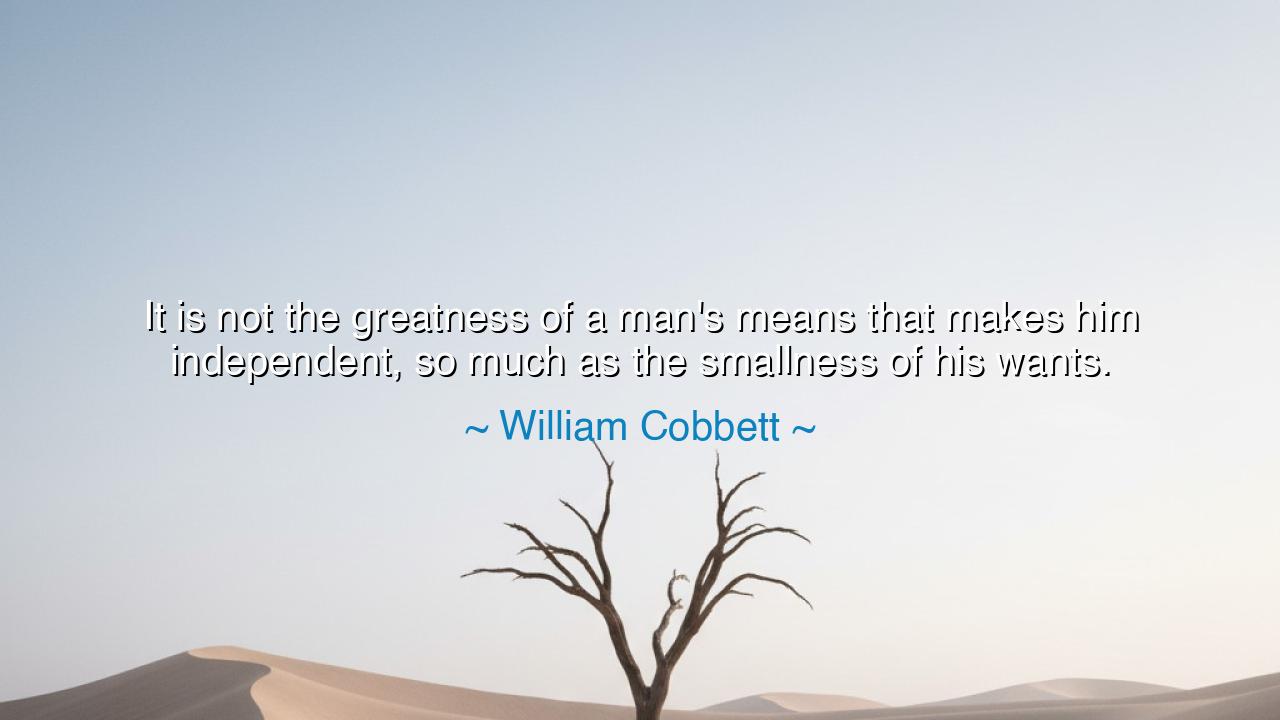
It is not the greatness of a man's means that makes him
It is not the greatness of a man's means that makes him independent, so much as the smallness of his wants.






Hear the words of William Cobbett, the English reformer and truth-teller, whose pen struck harder than the sword: “It is not the greatness of a man’s means that makes him independent, so much as the smallness of his wants.” In this simple yet profound saying, Cobbett reveals the eternal law of contentment and freedom — that independence is not born from abundance, but from restraint. A man may command kingdoms and still be a slave to his desires; another may own but a patch of earth and yet walk as free as the wind. For it is not gold that binds us, but longing; not poverty that imprisons us, but greed.
The origin of these words lies in Cobbett’s own life. Born into humble beginnings in 1763, he rose through hardship, self-education, and labor to become one of Britain’s most passionate voices for justice. He saw how men, rich and poor alike, were trapped — some by want, others by excess — and he learned that the true measure of freedom lies not in wealth, but in mastery over desire. To Cobbett, independence was a moral state, not an economic one. He believed that a man who wants little cannot be bought, cannot be bent, and cannot be broken — for his happiness does not depend upon what the world can give or take away.
The ancients, too, understood this truth. The philosopher Diogenes of Sinope, who lived in a barrel and owned nothing but a cloak and a lamp, once told the mighty Alexander the Great to “stand out of my sunlight.” Alexander, ruler of the known world, looked upon him with awe and said, “If I were not Alexander, I would wish to be Diogenes.” Why? Because the king, though powerful, was chained to his conquests, while the beggar-philosopher was free in spirit. Diogenes’s wants were few, and therefore his soul was sovereign. Cobbett, writing centuries later, echoed the same wisdom: the fewer our needs, the stronger our independence.
There is a story told of George Washington, who, when offered the chance to become king of the new United States, declined. He returned to his farm at Mount Vernon, content with peace and simplicity. In that act, he proved that greatness lies not in ruling others, but in ruling oneself. Washington’s smallness of wants gave him the strength to walk away from power — a deed that crowned him with a nobility higher than any throne could offer. So too, Cobbett teaches that the man who can live within his means, who seeks not excess but sufficiency, achieves a liberty that neither coin nor crown can buy.
Cobbett’s wisdom strikes deep because it speaks to the struggle of every age. The world entices us to want more — more comfort, more possessions, more praise. Yet each new desire, once granted, breeds another, and the chain grows heavier. He saw his countrymen enslaved not by masters, but by debts and cravings. “Simplify your wants,” he urged, for the man who needs little cannot be ruled by fear or bribery. A small house can hold a large spirit; a humble meal can feed a rich heart. To depend on less is to owe nothing, and to owe nothing is to be free.
This teaching is not a call to poverty, but to balance and self-command. The ancients would call it moderation — the golden mean between indulgence and deprivation. Cobbett’s independence is not withdrawal from life, but mastery within it. To govern one’s wants is to wield the greatest power of all: the power over oneself. He would remind us that riches are not evil, but they are dangerous when they master their owner. The wise man enjoys wealth without being enslaved by it, just as a sailor uses the wind without letting it drive him off course.
O listener, take this lesson to heart: the road to independence does not run through palaces or markets, but through the quiet chambers of the soul. Ask yourself not, “How much can I gain?” but “How much can I live without and still be content?” Cultivate gratitude, for gratitude is the guardian of freedom. Curb desire, for desire is the beginning of bondage. Seek sufficiency, not excess; simplicity, not splendor. For every possession we can relinquish, we reclaim a piece of our freedom, and every craving we conquer adds another stone to the fortress of our peace.
Thus, let William Cobbett’s words endure as a beacon of true independence. Wealth fades, fortunes shift, and power passes from hand to hand — but the man who governs his wants is sovereign forever. His mind is his kingdom, his heart his treasury, his conscience his crown. Let your riches be your virtue, your joy be your sufficiency, and your freedom be your restraint. For in the smallness of your wants lies the vastness of your liberty — and in that liberty, the soul stands invincible.






AAdministratorAdministrator
Welcome, honored guests. Please leave a comment, we will respond soon